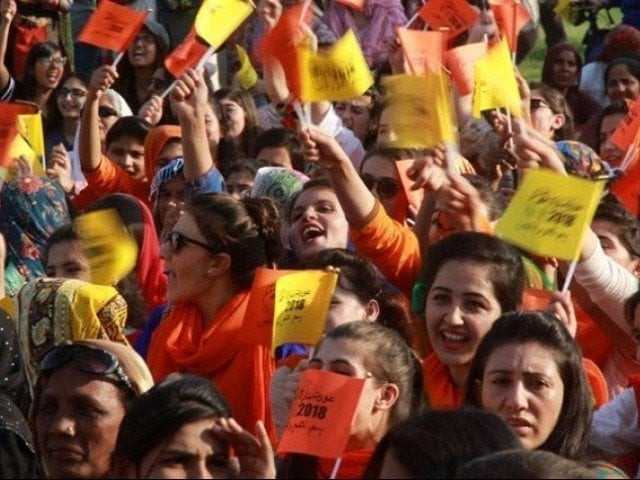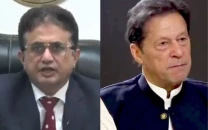IHC rejects petition seeking ban on Aurat March
IHC chief justice says organisers are demanding rights granted in Islam

Slogans are for rights that are not given to women, says IHC chief justice during hearing. PHOTO: EXPRESS/FILE
Dismissing the plea, IHC Chief Justice Athar Minallah observed that the event, observed on the International WomenÔÇÖs Day, should be taken as an opportunity to introspect by the petitioners and citizens because of the practices against women that were ÔÇ£flagrantly offensive to the injunctions of IslamÔÇØ rampant in the society.
The judge noted that the right to assembly was a fundamental right but the court expected the participants of Aurat March to exercise it in accordance with law and ensure that their ÔÇ£conduct was consistent with the norms of decencyÔÇØ.
In their petition, eight citizens had argued that the march was contradictory to ÔÇ£Islamic values and the moral ethos of the Pakistani cultureÔÇØ and named the federal government and the chief commissioner of Islamabad as respondents.
LHC green-lights Aurat March, but with conditions
During the hearing, they contended that slogans raised by the participants including ÔÇ£Mera Jism, Meri Marzi (My Body, My Choice)ÔÇØ were offensive, in violation of Islamic injunctions and against established norms. They feared that such slogans would create unrest in the society.
The IHC chief justice questioned how the slogans were in contradiction to Islamic values.
ÔÇ£These slogans are asking for the rights given to them [women] in Islam,ÔÇØ the Justice Minallah observed.
ÔÇ£How can we interpret the meaning of these slogans ourselves when the organisers [at a press conference] have clarified that they were asking for the rights granted to them in Islam.ÔÇØ
The judge asked the petitioners' lawyers about the difficulties faced by women in the country in terms of cruel traditional practices and inheritance cases despite Islamic laws in place that guaranteed their rights.
ÔÇ£The Holy Prophet (PBUH) had stopped the burial of baby girls alive. However, the birth of a girl is not considered ÔÇÿgoodÔÇÖ in our society,ÔÇØ the judge added.
ÔÇ£Various Islamic laws are being seriously violated in our society. The court hopes that the petitioner also approaches it for their enforcement.ÔÇØ
The IHC chief justice stressed the need for seeing the event in a positive light.
ÔÇ£If something goes against the law on March 8, then it will be dealt with legally,ÔÇØ Justice Minallah told the petitioners.
In his eight-page judgment, the IHC chief justice cited how 14 centuries ago, the Holy Prophet (PBUH) had spread the message of Almighty Allah ÔÇô ÔÇ£a revolution, which has no parallel in human history.ÔÇØ
The Aurat March 2020 poster that led to rape threats
He noted that female infanticide was rampant and an acceptable norm of the society in the pre-Islamic era.
ÔÇ£Women were treated as chattel, having no rights at all. The pre-Islamic times did not recognise any rights of the women. The patriarchal culture subjugated and treated women as property,ÔÇØ the verdict read.
ÔÇ£The advent of Islam prohibited female infanticide and gave a woman her own identity. It recognised the right of a woman to enter into a marriage contract based on her free will. For the first time women were given the right to inherit property and to own and manage it on their own. They were given the right to engage in business and their education was declared an obligation of the State.ÔÇØ
The judge noted that all this was happening at a time when the rest of humanity was treating women as an object and as property, having no rights whatsoever. ÔÇ£It was indeed a revolution against the patriarchal and misogynist norms and culture.ÔÇØ
The judge questioned asked whether these Islamic injunctions, which had ushered in a revolution unparalleled in human history, were being followed and implemented in our society today.
ÔÇ£If not, then why any expressive conduct on the International WomenÔÇÖs Day may not be interpreted as a demand for those rights given to women by Almighty Allah?ÔÇØ
The IHC chief justice noted that courts across the country were inundated with litigation brought by women against the denial of their inheritance rights.
ÔÇ£Mothers, sisters and daughters are denied their rights which have been expressly given to them by Almighty Allah in unambiguous terms in the Holy Quran. In defiance of the explicit commands of Islam, child marriage, rape and honour killings are not uncommon in our society today,ÔÇØ the judgment read.
ÔÇ£Women are forced into marriage against their will. Heinous traditions of Karokari, Swara, Wani and other forms of exploitation are being practiced in a State where 97% of the population professes to be Muslim.ÔÇØ
The judge observed that tribal and other societal norms seemed to have taken precedence over the Islamic injunctions.
ÔÇ£Female children are not safe and there cannot be a more offensive illustration than the unimaginable pain and agony suffered by little innocent ÔÇÿZainabÔÇÖ.ÔÇØ
Justice Minallah noted the alarming aspect that there was no outrage against the practices and mindsets which are a blatant violation of the unambiguous injunctions of Islam. ÔÇ£The practices and attitudes highlighted above are prevalent in our society and are public knowledge. Evidence of these practices is the female victims whose heartrending stories are heard by the courts across the country on a daily basis. These norms are not only offensive but blasphemous.ÔÇØ
The judge called for observing the International WomenÔÇÖs Day in this context. ÔÇ£It should be observed as a day of introspection. The petitioners and the society should demonstrably show their abhorrence and outrage against the norms of certain sections of our society, which are in defiance to the Islamic injunctions, some of which have been discussed above. There is a need to accept the reality and to change mindsets by demonstrably showing outrage against the flagrant violations of the commands of Almighty Allah. Islam had brought a revolution against tribal patriarchal culture and misogynist norms.ÔÇØ
The IHC chief justice stressed the need for the members of the society to ask themselves whether Islamic injunctions regarding the rights of women were being respected and followed by all those who claimed to be Muslims.
ÔÇ£If not, then there should be outrage against the mindsets which are akin to the pre-Islamic patriarchal and misogynist culture and norms. Instead of wasting energy on giving interpretations to the slogans, the explanation of the proponents and their intent should not be doubted. Minds should think positively rather than doubting the intentions of others based on conjectures and presumptions.ÔÇØ
The judge observed that eye of the beholder should see in the words inscribed on placards and used as slogans as demanding outrage against the flagrant violation of the clear and unambiguous injunctions of Islam.
ÔÇ£The petitioners and citizens are expected to take this as an opportunity to introspect and demonstrably show outrage against the practices, which are flagrantly offensive to the injunctions of Islam e.g. mindsets that do not welcome the birth of a female child, honour killings, rape , practices such as Wani, Swara, Karokari , etc. If this happens, then many innocent ÔÇÿZainabsÔÇÖ will be saved from being treated savagely,ÔÇØ he noted.
ÔÇ£The Holy Prophet (PBUH) had spent years trying to change mindsets and that is the need of the hour. The tribal patriarchal traditions and societal norms, based on egos and obscure insecurities, which offend the injunctions of Islam , have to be defeated through collective struggle so that no mother, sister or daughter suffers the agony of litigation to assert rights of inheritance nor innocent ÔÇÿZainabs ÔÇÿhave to endure unthinkable pain and agony.ÔÇØ
However, judgment also read that the court expected the proponents of Aurat March to exercise their constitutional rights in accordance with law having regard to conduct that is consistent with the norms of decency. ÔÇ£It is an opportunity for them to prove those who doubt their intentions wrong,ÔÇØ Justice Minallah observed.
For more on Aurat March, watch our explainer video here:
Presented by: Abdul Majid Awan and Asfa Sultan
Produced and Scripted by: Shaheera Anwar
Production co-ordinator: Sitara Arshad
Cameraman: Muhammad Danish Khan
Sound: Imran Abbasi
Design, Animation and Music: Express Group Creative Department



















COMMENTS
Comments are moderated and generally will be posted if they are on-topic and not abusive.
For more information, please see our Comments FAQ